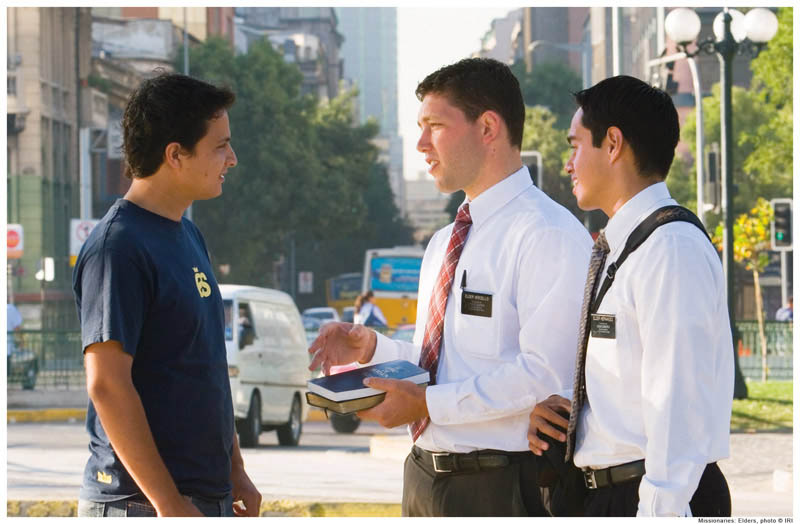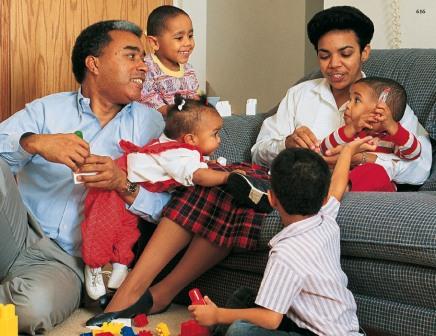 Recently Michael Otterson, head of Public Affairs for The Church of Jesus Christ of Latter-day Saints (sometimes called the Mormon Church) wrote an interesting On-Faith blog post about the Book of Mormon Musical. The musical’s crude and blasphemous language was designed to mock religion and to suggest God and His churches have nothing to offer in a real world of poverty and suffering. “Specifically, I’m not willing to spend $200 for a ticket to be sold the idea that religion moves along oblivious to real-world problems in a kind of blissful naiveté,” Brother Otterson said. (See Otterson, Michael. “Why I won’t be seeing the Book of Mormon musical.” Washington Post [Washington DC] 14 Apr. 2011: n. pag. Washington Post. Web. 21 Apr. 2011.)
Recently Michael Otterson, head of Public Affairs for The Church of Jesus Christ of Latter-day Saints (sometimes called the Mormon Church) wrote an interesting On-Faith blog post about the Book of Mormon Musical. The musical’s crude and blasphemous language was designed to mock religion and to suggest God and His churches have nothing to offer in a real world of poverty and suffering. “Specifically, I’m not willing to spend $200 for a ticket to be sold the idea that religion moves along oblivious to real-world problems in a kind of blissful naiveté,” Brother Otterson said. (See Otterson, Michael. “Why I won’t be seeing the Book of Mormon musical.” Washington Post [Washington DC] 14 Apr. 2011: n. pag. Washington Post. Web. 21 Apr. 2011.)
He then went on to evaluate whether or not this concept is true. To do so, he thought about the seven years the creators spent making a musical that mocked God and His followers—not just Mormons, but religious people in general. Some have also suggested it should be condemned for its negative and stereotypical portrayals of Ugandans.
Then he looked at what the Mormons spent those same years doing in Africa. While the creators of the musical were spending their time working on a way to make fun of Africans, Mormons were actually in Africa trying to fix the problems the musical mocked.
He offered several examples of the kinds of problems the Mormons and other Christian groups were trying to resolve. For example, Mormons gave more than four million Africans access to clean drinking water for the first time. They provided wheelchairs to 34,000 children in Africa. Millions of African children have received vaccinations through church-sponsored programs there. Mormons have provided vision improvement or restoration to more than 126,000 Africans. They trained 52,000 Africans to save the lives of infants through a neonatal resuscitation training. 20,000 Nigerians were helped with clothing, food, and supplies during that time.
That’s what the Mormons were doing during those seven years. While the musical’s creators spent that time creating a musical that does nothing to fix the problems they mocked, the Mormons they mocked were actually in there working to make life better in Africa. The creators might think religion and churches have nothing to offer those living in great poverty, but around the world, religious people and churches are in the trenches, working hand in hand with people in developing nations to improve lives. Pure religion isn’t just about talking—it’s also about doing. Jesus Christ shared His message of faith, but He supplemented it with material changes—he healed the sick, comforted the sad, and fed the hungry. This is what his followers—not just Mormons, but most religious people—are doing.
Jesus and His followers often took their messages of faith to those who were suffering. He knew, as do His followers, that faith alone can bring hope to those who previously had none. When people begin to understand who they are and who they can become, when they are treated with love and respect, not mocking, they can move beyond the poverty in which they find themselves. Through programs such as those described above or the literacy programs the Mormons run, people can grow and develop beyond measure. Religion provides for many hope and faith and courage they were unable to find on their own.
The gospel of Jesus Christ can help people understand why they live and how they can make the most of their lives. The morality offered by religion helps to prevent many of the sorrows people face when they mock morality. AIDS, unwanted pregnancies, harming others, crime…so many of life’s hardships, our own or those of others who are affected by our choices, can be avoided when people choose to live by Christian values.
If a person experiences a life of hardship and believes this is all there is and all there ever will be, it can make the suffering seem meaningless and therefore much harder. However, when a person understands the place this life holds in the eternal scheme of things, it can put suffering in its proper place.
Mormon beliefs teach that mortality is the center of a three-act life. The first act takes place in Heaven, where we were created by a loving Father. We lived with Him as spirits. We didn’t have bodies, but we were ourselves. We grew, learned, and developed. We came to know God and He came to know us. Eventually, of course, every child has to leave home and so did we. God created for us an earth. There we would live for a time to gain a body and a family. We would have experiences and trials. We’d try to discover and fulfill our mission to find out who we really are—children of a loving Heavenly Father—and His sources of truth.
This time on earth is the second act. It was never meant to be easy because easy lives don’t teach us things. We learn through our trials and our challenges, through the times we become more than we thought we could be. We can choose to take our trials coated in whining and misery or we can choose to take them with courage and joy. Each choice has consequences we cannot escape.
Christians have a responsibility to help others through their trials. We are to go into the world and alleviate suffering, as did the Savior.
Christianity, including Mormonism, helps people to understand the value of accepting trials with grace and faith. It can show us the purpose of trials and the blessings of handling them well. As Christians, we take our trials in hand and ask, “What does this trial have to offer me? Why did God decide to let me face it? How has He planned to help me through it?”
Trials are designed to prepare us for the amazing third-act, the grand finale of the play. This is when those who have honored Jesus Christ and His teachings return home and live out their eternities in joy and peace.
When we see this life as only the centerpiece of a glorious three-act play, the trials have meaning and purpose. God does not create every trial, but He does allow us to face them, just as you might allow your own child to experience trials in order to help him grow. He loves us all equally, but He knows we are not all the same. We have different needs, different capacities. Our trials are specifically targeted to our own needs. If we live them well and take from them the blessings and lessons they can offer, we will become exactly who God knows we can really be.
This is what the creators of the Book of Mormon Musical don’t understand. You can spend seven years of your life working on a project that mocks others for profit, or you can spend them alleviating suffering. We can choose to spend our lives making fun of other people and of sacred things, we can choose to mock those who suffer…or we can go out into the world and actually fix the problems we see.
The choice is ours to make, but we cannot choose the consequences of those choices.
About Terrie Lynn Bittner
The late Terrie Lynn Bittner—beloved wife, mother, grandmother, and friend—was the author of two homeschooling books and numerous articles, including several that appeared in Latter-day Saint magazines. She became a member of the Church at the age of 17 and began sharing her faith online in 1992.




